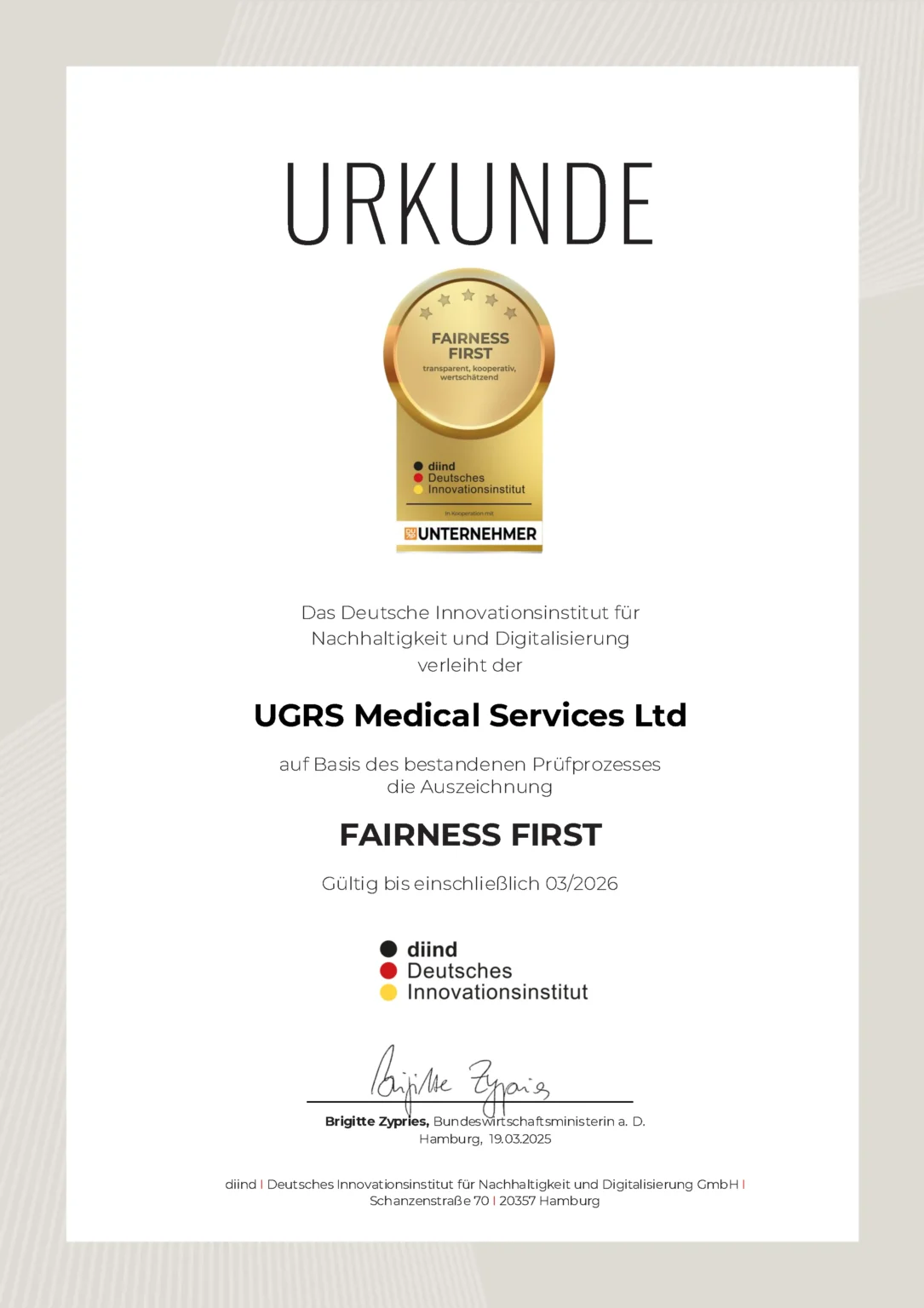Home » UGRS.Blog – Latest Topics & Insights on Urology and Penis Enlargement » What makes the prostate so important for men’s health?
What makes the prostate so important for men's health?
The prostate is small but mighty: this walnut-sized gland plays a central role in male health. It not only influences fertility and urine flow, but can also develop serious diseases. In this blog post, we explain everything you need to know about the prostate, its functions and why regular preventive care is so important from the age of 45.
What is the prostate and what is its function?
The prostate lies directly below the bladder and surrounds the urethra. It produces a special secretion that keeps the sperm mobile and protects them. Without this prostate secretion, successful fertilization would hardly be possible. Seminal fluid consists largely of prostate secretions.
The muscles of the prostate also ensure the ejection of seminal fluid during ejaculation. It is therefore crucial for sexual function and urination.
What happens in the case of benign prostate hyperplasia (BPH)?
With increasing age, the prostate grows in most men due to hormonal changes, changes in living conditions and the calcifying healing of inflammation in the course of life. This benign enlargement of the prostate is called benign prostatic hyperplasia (BPH). It is not life-threatening, but can significantly reduce the quality of life.
Typical symptoms:
- Frequent urge to urinate, especially at night, because the prostate presses against the bladder
- Weak urine stream because the urethra runs through the prostate and is compressed by the enlargement
- Feeling of incomplete bladder emptying
Benign prostate enlargement can be treated as follows:
Form of therapy
Description
Medication
Alpha-blockers, 5-alpha-reductase inhibitors
Minimally invasive procedures
Laser therapy, water vapor therapy
Surgical interventions
TURP: Transurethral resection of the prostate
The earlier BPH is detected, the easier it is to treat.
How can prostate cancer be detected early?
Prostate cancer is the most common cancer in men in Germany. In the early stages, it is often asymptomatic – which is why prevention is so important!
Risk factors:
- Age over 50 years
- Family history
- Unhealthy lifestyle
Early detection methods:
- Palpation examination (rectal)
- PSA test (determination of the prostate-specific antigen in the blood), here the course of the PSA value in comparison with different tests is of particular importance
- Ultrasound, which can only detect larger changes
- The greatest certainty in early diagnosis is currently provided by an MRI examination specifically tailored to the prostate.
Regular check-ups can save lives – if diagnosed in good time, the chances of recovery are very good.
What is prostatitis (inflammation of the prostate)?
Prostatitis can be acute or chronic. It is often very painful and should always be clarified by a urologist.
The causes of prostatitis are often due to certain practices of sexual intercourse that take place without protection. First and foremost is intercourse in the rear entrance, as this is where a large number of bacteria are found that the urethra’s immune system cannot fight off.
Untreated acute prostatitis can develop into chronic prostatitis, which is then very difficult or even impossible to treat, as the medication used has difficulty penetrating the spongy prostate via the bloodstream.
Typical symptoms:
- Burning sensation when urinating
- Pain in the perineum or lower back
- Fever (in acute form)
- Pain/burning when ejaculating
- Unusual tiredness and fatigue
Diagnosis:
The diagnosis is made on the basis of the typical combination of symptoms, sometimes combined with a specific pathogen determination and the PSA value history.
Treatment:
Antibiotics, painkillers, anti-inflammatories and, if necessary, physiotherapy.
Why is prostate screening so important?
Early detection of prostate disease is the key to successful treatment and therefore also to protecting sexual function. The statutory health insurance fund covers annual check-ups from the age of 45.
Recommended preventive examinations:
- Palpation examination
- PSA value determination
- Ultrasound of the prostate
Tip: Even if you have no symptoms, you should go for an annual prostate check-up - earlier detection means better treatment!
Conclusion: Small glandular bodies, big effect
The prostate is more than just an “obstacle to ageing”. It affects fertility, sexuality and urinary function. Take care of your prostate in good time – your later self will thank you for it.
The medical information provided on this website is for general information purposes only and does not replace a personal consultation with our doctors. As a tertiary medical center, we are also available for second opinions.
© Copyright Jörg Hagen, Doctor
About the author
Jörg Hagen, doctor
The author Jörg Hagen has been the medical director of UGRS International Germany since 1995 and has over 30 years of experience in penis enlargement and complex urological issues. He is regarded as one of the leading experts in the interests of patients in Europe. His international activities, excellent diagnostics and legal successes in patient rights make his assessments particularly well-founded. Patients appreciate his scientifically based, discreet and trustworthy care. His articles are based on many years of practice and well-founded information at the highest level.
This content is for general information purposes only and does not constitute medical advice, diagnosis or treatment recommendations. It is in no way a substitute for a professional examination or treatment by a licensed physician. If you have any health complaints or uncertainties, please always consult a medical professional – especially if you have any questions about intimate surgery or sexual health.










